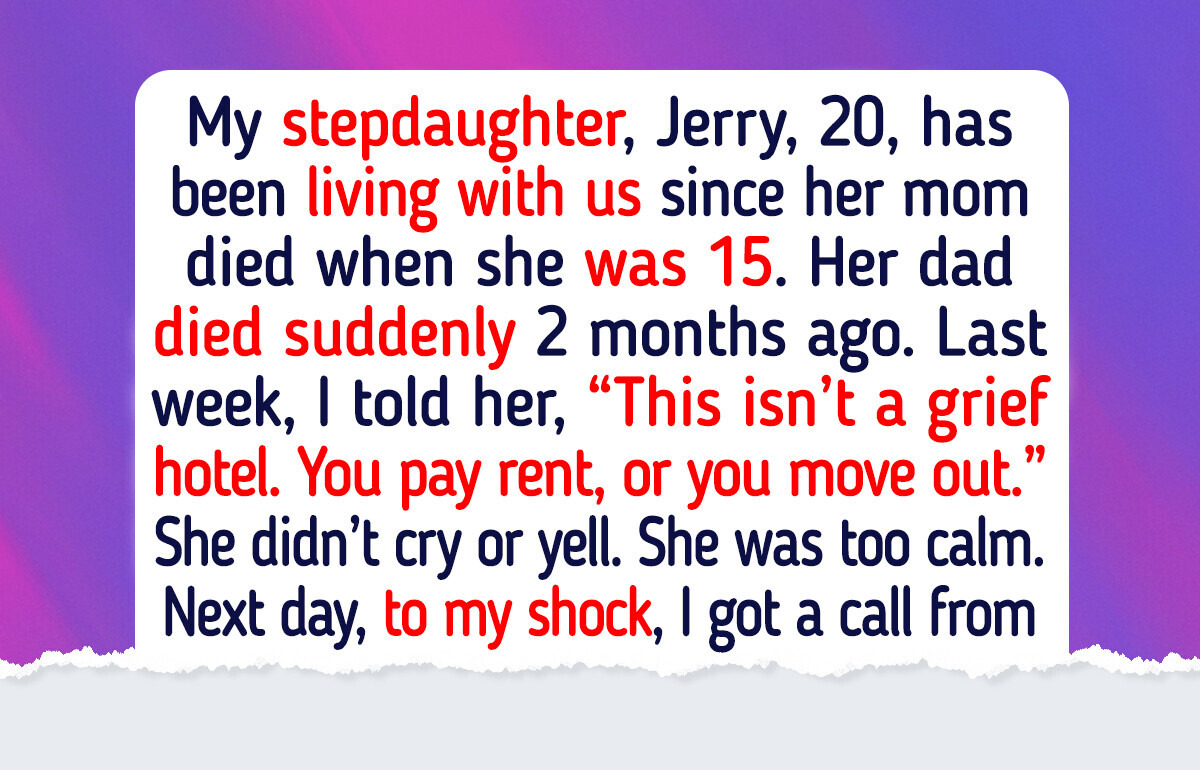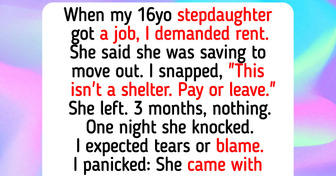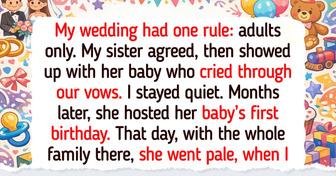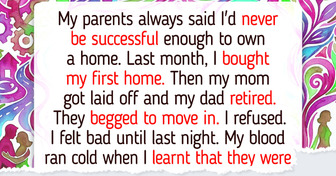If you spoke to her like that then hell yes you were being nasty. I understand she needs to help out but you were cruel for speaking to her like that seeing as she just lost her remaining parent. You don't seem to care that she is grieving also
I Made My Stepdaughter Pay Rent After My Husband’s Death, My House Has New Rules Now

We recently received a letter from our reader Linda H. — a woman who just lost her husband and was suddenly left to run the household alone. In the middle of her grief, she made a decision that lit a firestorm around her: she asked her 20-year-old stepdaughter to either start paying rent or move out.
Now, people are calling her cold, cruel, even a heartless monster. But Linda says it’s not about punishment — it’s about finally teaching an overprotected young adult to stand on her own feet.
Read the full story and tell us: Did Linda go too far, or is she doing what had to be done? Is she really as heartless as people say — or just the only adult left willing to teach hard lessons?

Here’s Linda’s mind-stirring story:
"Hi Bright Side,
I’m Linda. I’m 43, my stepdaughter, Jerry, is 20. Her dad—my husband—died suddenly two months ago. Heart attack. No warning. One day he was mowing the lawn, next day I’m picking out his urn. Life.
Now, the house. It’s big. He and I bought it together five years ago, both names on the mortgage. His daughter moved in with us when she was 15, after her mom passed. Trauma, grief, therapy, the whole thing.
My husband bent over backward for her. Anything she wanted—done. She didn’t do chores, didn’t work, didn’t go to college, just sat around “developing a startup” with Dad. He called it “nurturing her dreams.” I called it freeloading.
Now he’s gone. And I’m still here, paying the bills. And guess what? She’s still acting like Daddy’s little CEO.
So, last week, I told her, “This isn’t a grief hotel. You pay rent, or you move out.” Simple as that. She looked at me like I was crazy or something. Said she’s “still processing” and “can’t work right now.”
I told her she has two options:
1. Get a job, pay rent like an adult.
2. Go find another place that lets you live for free.
Because here’s the thing: This is my home now. I’m not her emotional support landlord. Life’s tough, kid. Nobody hands you anything. Your dad did, but that’s over.
She didn’t cry. She didn’t yell. She just nodded and said, “Okay.” Real calm. Too calm.
Fast-forward to yesterday—I get a call from Chase. Turns out she got into my husband’s accounts and filed paperwork to get access to the LLC he set up for that “startup” they were building. Guess who’s now a 51% stakeholder in the business that pays my property taxes?
Yeah. Her. Now, she has created a home office and now calls it her “corporate headquarters.” In my house. I told her it’s not serious, and she goes, “What? You said I need to start paying to live here. I’m working now.”
In addition, now everyone’s calling me a heartless witch for “kicking out a grieving orphan” and “robbing her of her home and choices.” Apparently I’m the villain for not wanting to play mommy-dearest to a grown adult who’s never paid a bill in her life.
So tell me, people, did I actually go too far trying to teach her how to stand on her own, or is this just what tough love looks like when there’s no dad left to sugarcoat it?"

Thank you, Linda, for sharing your incredibly tough and complex story with the Bright Side editorial team. We understand how overwhelming it must be to suddenly manage a household alone, while also navigating the emotional and practical challenges of living with a grieving young adult like Jerry, who’s also lost both parents.
We see how both of you are trying to survive in your own way, and we’ve gathered a few pieces of advice that might help you move forward — not just as a landlord and tenant, but perhaps, someday, as something closer to a family again.
1. Set Boundaries, Not Walls.

According to specialists, setting boundaries after a loss is healthy — but cutting off emotional support can trigger deeper trauma, especially for someone still grieving. Try reframing the rent rule as part of a shared responsibility plan, rather than a punishment. It’s okay to expect adult behavior, but combining structure with empathy can make all the difference.
2. Honor Her Grief Without Enabling.

Clinical psychologists stress that grief often stalls development, especially when it comes after previous loss (like Jerry’s mom). Let her know you understand she’s hurting — but also gently remind her that progress doesn’t have to mean perfection. Encourage small steps toward independence, and offer check-ins to acknowledge emotional as well as financial growth.
3. Check the Legal Ground First.
If your husband didn’t leave a clear will, the legal situation around the house and business could get murky. Consult an estate lawyer to ensure that your shared ownership is secure, and clarify Jerry’s rights to any assets. It’s not about locking her out — it’s about protecting yourself from future misunderstandings or claims.
4. Consider Mediation Before Escalation.

A neutral third party, like a family mediator or grief-informed counselor, can help you both talk through expectations, resentments, and future plans without going nuclear. These professionals can help de-escalate power dynamics that often arise in blended families, especially after a sudden death. Even one or two sessions might help clear the air.
5. Create a “House Plan” Together.

Instead of delivering rules top-down, try involving Jerry in a co-authored agreement about living arrangements, work contributions, and timelines. Psychologists say that young adults are more likely to meet expectations when they feel agency in the process. It doesn’t mean you’re giving up control — it means you’re building structure with her, not against her.
And here’s a story of a woman, who had to make a really tough decision about her pregnant daughter and her 6 kids. She kicked them all out of her house after she made a shocking discovery about her daughter’s plans and attitude. Read more to find out the details of this controversial story that provoked vivid debates once it was published.
Comments
I'm on the daughter's side
Looks like "Step-Mommy Dearest" discovered that Karma really is a b**ch.
Let me get this straight, your husband and stepdaughter were developed a start up that is, at the very least, making enough money to pay real estate taxes, and you surprised she took majority ownership of it?
And how exactly were you expecting this LLC to continue to bring in revenue without any running it? You did say you were also working on it, so I doubt you know enough to keep it afloat.
And this on top of her dad only having been dead fir 2 months. Did you offer her any kind of time line, just say 'pay up immediately or get out?'
Related Reads
I Refused to Be My Dad’s Free Caregiver, Then He Dropped a Bombshell

I Refused to Sacrifice My Sick Days, and It Blew Up at Work

12 Moments When Children Used Kindness to Silence Rude Adults

17 Stories That Reveal the Beautiful Struggles and Victories of Blended Families

I Refuse to “Earn” Trust I’ve Already Proven for 8 Years

I Refused to Onboard the New Hire Who Makes 1.5x My Salary

I Refuse to Watch My Teenage Daughter Give Her Entire Salary to Her Boyfriend

My Sister Ruined My Child-Free Wedding—So I Served Her Cold Revenge

My Parents Told Me I’d Never Own a Home, Now They Want to Move In

13 Times Stepparents Refused to Give Up on a Child Who Didn’t Want Them—Until One Moment Changed Everything

I Refused to Pay for Our Valentine’s Dinner—Then I Learned the Heartbreaking Truth

My MIL Ignored Our Rule and Bought My Son a Puppy, She Wasn’t Ready for My Surprise

